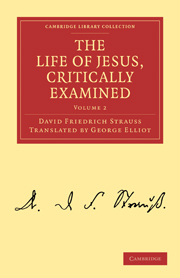Book contents
CHAPTER VIII - EVENTS IN THE PUBLIC LIFE OF JESUS, EXCLUSIVE OF THE MIRACLES
Published online by Cambridge University Press: 16 May 2011
Summary
GENERAL COMPARISON OF THE MANNER OF NARRATION THAT DISTINGUISHES THE SEVERAL EVANGELISTS.
If, before proceeding to the consideration of details, we compare the general character and tone of the historical narration in the various gospels, we find differences, first, between Matthew and the two other synoptists; secondly, between the three first evangelists collectively and the fourth.
Among the reproaches which modern criticism has heaped on the gospel of Matthew, a prominent place has been given to its want of individualized and dramatic life; a want which is thought to prove that the author was not an eye-witness, since an eye-witness is ordinarily distinguished by the precision and minuteness of his narration. Certainly, when we read the indefinite designation of times, places and persons, the perpetually recurring τότε, then, παϱάγων ἐϰεĩϑεν, departing from thence, ἂνϑϱωπις, a man, which characterize this gospel; when we recollect its wholesale statements, such as that Jesus went through all the cities and villages (ix. 35; xi. 1; comp. iv. 23); that they brought to him all sick people, and that he healed them all (iv. 24 f.; xiv. 35 f.; comp. xv. 29 ff.); and finally, the bareness and brevity of many isolated narratives : we cannot disapprove the decision of this criticism, that Matthew's whole narrative resembles a record of events which, before they were committed to writing, had been long current in oral tradition, and had thus lost the impress of particularity and minuteness.
- Type
- Chapter
- Information
- The Life of Jesus, Critically Examined , pp. 189 - 234Publisher: Cambridge University PressPrint publication year: 2010First published in: 1846



